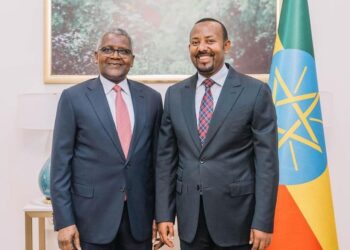In 2018, there was a significant struggle for political reform, leading to Prime Minister Abiy Ahmed (Ph.D.) coming to power. His time in office began with ambitious plans and actions aimed at promoting political transparency and addressing critical issues. However, the initial momentum did not last. While the political reforms of 2018 aimed to foster greater openness and improve governance, there remained worry about whether these measures would quickly address the longstanding challenge of mounting debt accrued over decades, and its potential impacts on economic stability. In 2019 China’s agreement to restructure part of Ethiopia’s $4 billion loan for the Addis Ababa-Djibouti railway provided temporary relief. That same year, Ethiopia launched the Homegrown Economic Reform I, signaling a commitment to tackle economic challenges by revitalizing the economy and fostering a favorable development environment.
This involved limiting government involvement in certain economic sectors, promoting private investment, encouraging greater private sector participation, mobilizing external resources, and implementing appropriate macroeconomic and sectoral policies. However, the COVID-19 pandemic broke out on the global economy, impacting Ethiopia through disruptions in trade, tourism, and domestic activities. To counteract these effects, the government implemented economic stimulus measures, including the waiver of outstanding tax liabilities, tax amnesty or relief on interest and penalties for tax debt, and extensions of filing and tax payment deadlines.
Amidst these challenges, the Northern Conflict added another layer of complexity to Ethiopia’s issues. The conflict in northern Ethiopia inflicted significant damage, costing the country $22.7 billion in infrastructure damage and an additional $6 billion in productivity losses between November 2020 and December 2021 alone. This amounted to a staggering 26% of GDP, as reported by an Ethiopian government assessment. Ethiopia anticipated a debt-to-GDP ratio of 33.8% for the year 2023, compared to 31.40% in 2021, as reported by the National Bank of Ethiopia (NBE). This increase reflects the country’s mounting debt burden. Additionally, Ethiopia faced the daunting challenge of repaying a USD 1 billion debt on its Eurobond. Despite efforts to manage its debt obligations, Ethiopia encountered significant hurdles, in effect becoming Africa’s third defaulter.
The failure to make a USD 33 million “coupon” payment on its Eurobond further exaggerated the situation, underscoring the pressing need for sustainable debt management strategies. In the middle of this challenge, Ethiopian officials engaged in negotiations with IMF representatives. A team from the International Monetary Fund (IMF), headed by Mr. Alvaro Piris, conducted discussions in Addis Ababa from March 19 to April 2, 2024, focusing on the government’s appeal for IMF assistance with its reform agenda.
At the end of the visit, Mr. Piris issued the following statement: “Building on earlier discussions, the staff team made substantial progress towards establishing how the IMF could support the authorities’ economic program. Discussions will continue at the IMF/World Bank Spring Meetings later this month. We thank the authorities for their warm hospitality and the productive discussions.” However, prolonged negotiations with the Washington-based lender have occurred due to the conflict in the country’s northern region and the inability to secure commitments for debt relief from creditors.
In addition, issues such as liberalizing the foreign exchange market, consolidation of the budget, speed of the reforms to be implemented, and phases of loan disbursement remained sticky issues, according to people familiar with the discussions. “Ethiopia faces a tough devaluation decision to secure an IMF bailout,” says Reuters in its headline. Abdulmenan Mohammed, an Ethiopian economic analyst based in Britain, informed Reuters that it appears challenging for Ethiopian authorities to meet the IMF’s demands. The authorities express concerns about the potential devaluation of the birr, fearing significant adverse economic consequences such as skyrocketing inflation and a surge in foreign currency-denominated debts when converted to birr.
Inflation has exhibited a decline from its peak, marking its second consecutive monthly decrease to reach 26.2% in March 2024, the lowest level since June 2021. This signifies a reduction from the 28.2% recorded in the previous month. The officials don’t want this declining inflation to go back to its high percentage again. Ending a discussion with the IMF without reaching an agreement could have severe repercussions on the economy.
If the nation’s creditors demand repayment, the consequences would be particularly challenging given the country’s default status. The economy may experience a shortage of foreign exchange (FX) to sustain essential services and goods. The recent IMF and World Bank spring meetings in Washington also concluded without reaching an agreement, leaving Ethiopian officials still contending with ongoing challenges in restructuring their debt.
We can take a look at what Zambia went through in our most recent case to restructure its debt and propel its economy in a very challenging time. Zambia faced a daunting challenge in restructuring its debt and reviving its economy amidst years of economic mismanagement characterized by overspending, corruption, and inefficiencies in resource management. By 2021, the country’s debt had soared to over 130% of its GDP, signaling unsustainable borrowing practices. Zambia’s heavy reliance on copper exports made it vulnerable to global commodity price fluctuations, particularly the slump in prices in 2014, which significantly impacted revenue generation. The ensuing decrease in export earnings exacerbated the country’s debt burden.
The Covid-19 pandemic and subsequent lockdowns further strained Zambia’s economy by disrupting economic activities, reducing government revenue, and increasing financial pressures. These pandemic-induced economic challenges only worsened the country’s ability to service its debt obligations. Additionally, Zambia’s creditor landscape shifted over the years from traditional Western lenders to a mix of public and private sector creditors, including Chinese lenders and bondholders like BlackRock, adding complexity to debt negotiations and restructuring efforts. The lack of historical fiscal discipline, characterized by excessive borrowing without a clear strategy for debt sustainability, played a significant role in accumulating unsustainable debt levels. This absence of effective debt management practices made it increasingly challenging for Zambia to avoid default. President Hakainde Hichilema played a crucial role in negotiating a bailout plan with the IMF and addressing inflation in Zambia.
After Zambia defaulted on its external debt in 2021, President Hichilema’s government worked with the IMF to secure a 38-month, $1.3 billion arrangement under the Extended Credit Facility. This deal was made possible through negotiations with a creditor committee co-chaired by France and China, Zambia’s top two creditors at the time. President Hichilema’s efforts in securing the IMF bailout plan were instrumental in curbing inflation and reassuring the markets. Following his election victory in 2021, the Zambian kwacha became the world’s top-performing currency against the US dollar, indicating improved market confidence in the country’s economic prospects. Under his leadership, inflation in Zambia decreased and remained under control, a positive development compared to regional and global trends. By renegotiating the debt terms, Zambia gains valuable breathing space to stabilize its economy, implement necessary reforms and pursue long-term growth. Negotiation is what helped Zambia to settle its burden.
What about Ethiopia?























